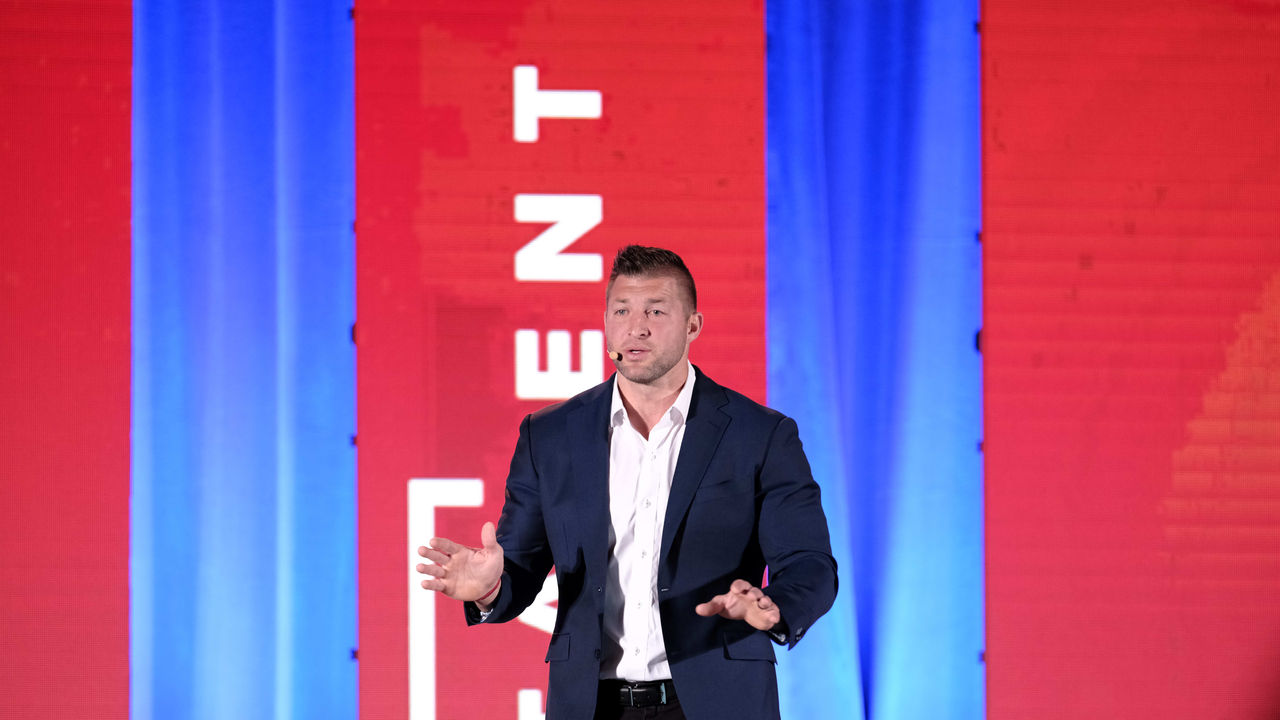
Momentary leadership can be demonstrated by anyone in a fleeting instant, but lasting leadership—the type that extends for generations—requires four key elements: respect, belief, passion and compassion.
Former NCAA football championship quarterback, Heisman Trophy winner and professional athlete Tim Tebow articulated what it takes to provide that level of leadership during the "Upskilling Talent" general session Wednesday at the SHRM Talent Conference & Expo 2022 in Denver.
Tebow shared several of his life stories from before his playing days and during his big career moments, as well as what he's been up to since leaving the playing field.
HR is in the ideal leadership position to benefit society, Tebow said, because "you get to touch and support so many in your companies; you can give your employees hope and confidence and be inspiring.
"It's one thing to 'feel' something, but it's a whole other thing to 'do' something, and leadership is about doing."
Leadership Built by Respect
Leadership can be spoiled when it's measured in "likes"—as social media has taught in recent years, Tebow said. "It's more about gaining respect. I'd love for a social media platform to, instead of offering its users a chance to click a 'like' button, they could click a 'respect' button. How many would click that?"
Liking something is an emotion that is "just on the surface," he said. "With respect, you have to work hard to earn it."
Tebow spoke of his freshman year in high school when he showed up for the first football practice and there was a competition to see who could do the most reps when curling a weighted bar. He positioned himself to go last in the competition, thinking it would give him an advantage. But when a senior lineman took that spot, Tebow was left to go second-to-last.
He did the most reps of anyone up to that point—so many that he injured his arms and had to be taken away for treatment. The senior who followed him, a powerfully strong young man who was tougher than anyone, stepped up and did enough reps to be the second-highest performer. But he stopped short, saying, "It isn't worth it" to go on.
That left an impression among Tebow's teammates: Would that senior quit on them when it mattered most? What about in the fourth quarter of a football game? For his own refusal to quit, Tebow earned his team's respect at that very first practice.
Respect can become contagious as an inspiration to those a person is leading, he said. "Just think, if we all buy into something, we can be champions."
Belief Can Take You Far
Tebow next spoke about the power of belief—specifically believing in yourself. He told the story of a boy whose parents did not support him in anything. But one teacher did, and that teacher asked the boy to take the SATs. The boy had no confidence, but he took the test anyway.
When the results came back, he had scored well, a 1480 out of 1600. That test score inspired him to improve in school, graduate and eventually get accepted at a major university. There, he continued his outstanding academic performance, graduated and went on to start his own company—eventually being named entrepreneur of the year.
Some time later, the county where he grew up contacted him because they had done an audit on test scores recorded years ago: He actually scored a 740 on the SAT, not 1480. But the young man shrugged it off. At that point, he knew he was capable of great things, because he believed in himself.
Understanding Passion and Compassion
Another ingredient in strong leadership is passion. Tebow said passion is caring so much for something that you're willing to suffer for it, and by showing passion, others will want to follow and support you.
He added that while it's important to lead with your convictions, you cannot let yourself be dictated by emotions. "When you go with your emotions, your life can turn into a rollercoaster, with some great days and others that are not so much," he said. "When you let your convictions guide you, there are no rollercoasters."
Finally, Tebow addressed the importance of compassion. It's passion, but directed at others. "A truly compassionate person is one who is willing to suffer with you in a supportive way—no matter who that person is or what their career title is," he said.
He told the story of recently visiting a faraway village, where the inhabitants had rarely welcomed anyone. There was one member of the village, Sherwin, who had become an outcast because of his malformed feet. Sherwin only had two close friends; others stayed away from him because they didn't want to become "cursed."
The two friends had a choice as to whether to be with Sherwin or the rest of the villagers. In the ultimate demonstration of love and compassion, Tebow said, they chose to be with Sherwin.
"The best definition of love I've ever heard is when someone puts forth their best interests in others in ways that support them," he said. "This was a true sign of love and leadership."
Paul Bergeron is a freelance reporter based in Herndon, Va.
An organization run by AI is not a futuristic concept. Such technology is already a part of many workplaces and will continue to shape the labor market and HR. Here's how employers and employees can successfully manage generative AI and other AI-powered systems.



